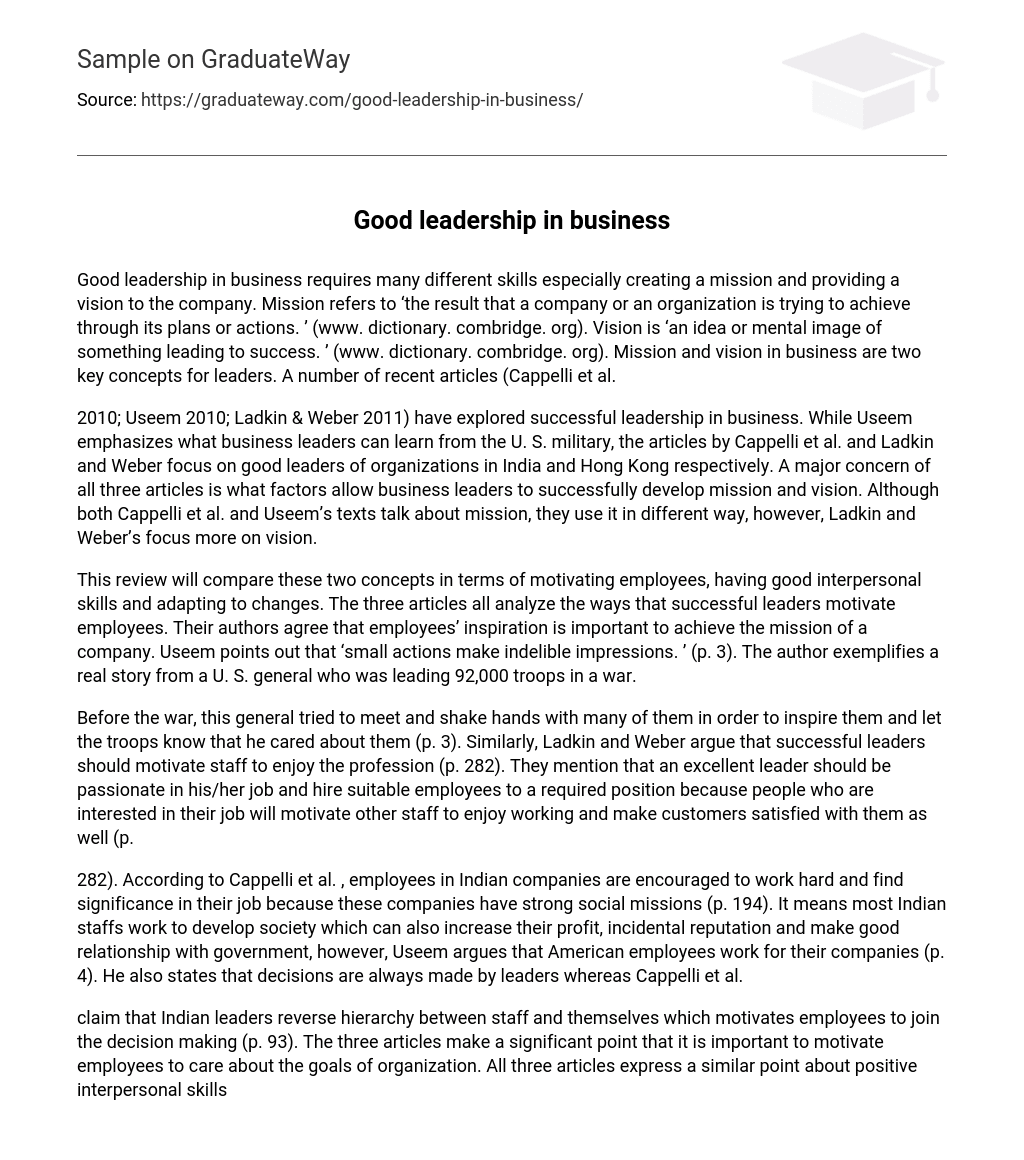Effective leadership in business necessitates a variety of skills, notably the ability to establish a mission and articulate a vision for the company. As defined by www.dictionary.combridge.org, a mission is the desired outcome that an organization seeks to attain through its plans and actions. Similarly, a vision is an idea or mental picture of what will lead to success. These concepts of mission and vision are critical for business leaders. Numerous recent articles, including the work of Cappelli et al., emphasize their importance.
The articles by Useem (2010), Ladkin & Weber (2011), and Cappelli et al. have investigated effective leadership in business. Useem discusses the lessons that business leaders can learn from the U.S. military, while Ladkin and Weber examine good leaders in Hong Kong and Cappelli et al. focus on leaders in India. A common concern in all three articles is the factors that enable business leaders to successfully develop mission and vision. Although Cappelli et al. and Useem discuss mission, they approach it differently, whereas Ladkin and Weber emphasize vision.
This article will evaluate and compare the two concepts of motivating employees, having good interpersonal skills, and adapting to changes. The three articles all focus on the various methods utilized by successful leaders to motivate their employees. According to the authors, motivating employees is crucial in order to accomplish a company’s mission. Useem emphasizes the significance of small actions, stating that they leave lasting impressions (p. 3). To illustrate this point, the author shares a true story about a U.S. general who led 92,000 troops during a war.
Before the war, this general made an effort to meet and shake hands with numerous individuals in order to inspire them and demonstrate his concern for the troops (p. 3). Likewise, Ladkin and Weber suggest that effective leaders should motivate their staff to find enjoyment in their profession (p. 282). They highlight the importance of a leader being passionate about their job and hiring individuals who are well-suited for specific positions. This way, those who are genuinely interested in their work can inspire other team members to also find fulfillment in their tasks, leading to customer satisfaction (p.
According to Cappelli et al. (p. 282), Indian companies motivate their employees to work diligently and find importance in their job due to their strong social missions (p. 194). This implies that the majority of Indian staff members strive to contribute to society, which can lead to increased profits, incidental reputation, and positive relationships with the government. In contrast, Useem (p. 4) argues that American employees work for their companies. He further contends that leaders are the ones responsible for making decisions, unlike what Cappelli et al. suggest.
Indian leaders are claimed to reverse the hierarchy between staff and themselves in order to motivate employees to participate in decision making (p. 93). The three articles highlight the importance of motivating employees to be invested in the organization’s goals. Additionally, all three articles emphasize the positive interpersonal skills exhibited by successful leaders. It is universally agreed upon that communication is one of these skills. Cappelli et al. ‘s article specifically emphasizes transformational leadership, which can inspire staff to care about the company’s mission and their leaders (p.
According to Cappelli et al., Ladkin and Weber also support the idea that effective leaders are able to handle diverse employees and effectively communicate a vision if they are skilled at explaining missions (Cappelli et al. p. 281; p. 283). Additionally, Cappelli et al. suggest that business leaders should possess the ability to create a sense of mission, while Ladkin and Weber emphasize the importance of being able to convincingly gain respect from others (Cappelli et al. p. 94; Ladkin and Weber p. 208).
According to the authors, successful leaders should possess open-mindedness and a sense of curiosity to discover innovative approaches (p. 281). They all emphasize the significance of good interpersonal skills in accomplishing company and societal goals. Additionally, all three articles highlight the importance of leaders’ ability to handle challenges and problems to achieve mission success. The authors concur that leaders must possess a vision to identify these issues.
Both Useem and Cappelli et al. argue that effective business leaders should refrain from micromanaging and instead foster an environment of trust and autonomy among their employees (Useem p. 4; Cappelli et al. p. 95). Cappelli et al. illustrate this point by discussing how the CEO of Bank of Baroda communicated the challenges they faced due to competition from other private banks and encouraged a collaborative approach to finding solutions (p. 95). Useem provides an example of a successful leader who effectively communicated a clear mission to the staff, resulting in the bank’s profitability and the victory of the Yankee army in the Civil War.
According to Useem (p. 3), leaders should make swift decisions in order to accomplish their missions within a constantly changing environment. On the other hand, Ladkin and Weber (p. 284-285) highlight the threat posed by technological advancements that have led to a 24/7 work environment, emphasizing the importance of continuous learning for leaders to effectively address challenges and retain talented employees. All three authors emphasize the significance of establishing clear goals for leaders. These articles collectively contribute to the development of a comprehensive understanding of mission and vision, which are essential for successful business leadership.
Both Hong Kong and the USA prioritize the mission of their companies, whereas leadership in India prioritizes the social mission. However, the most valuable text is Cappelli et al.’s as it highlights the importance of CSR (corporate social responsibility) in ensuring that each company contributes to the betterment of society and the country. Successful leaders must familiarize themselves with diverse cultures as their businesses expand globally. In my opinion, every leader should place more emphasis on developing a clear mission and vision. Further research can be conducted on integrating various cultures in China.





